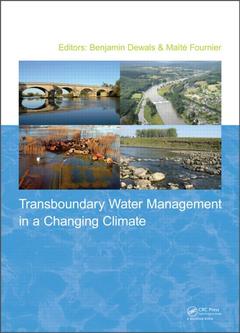Transboundary Water Management in a Changing Climate
Coordonnateurs : Dewals Benjamin, Fournier Maïté

Most large river basins in the world are transboundary. Experience with such basins emphasizes the urgent need for more efficient transnational water management. This book details recent initiatives undertaken in the Meuse basin (North-West Europe) to develop a transnational adaptation strategy to deal with the impact of climate change.
In the 21st century, floods in the Meuse basin are expected to become more intense and more frequent, while summers will be hotter and drier. The transnational adaptation strategy combines scientific research to fill important gaps in knowledge, innovative natural and structural water retention measures, and enhanced (transnational) crisis management. As a scientific basis for this adaptation strategy, common climate and hydrological scenarios have been developed, as well as more uniform methods for transnational flood risk assessment and mapping.
The contributions in Transboundary Water Management in a Changing Climate were presented at the final conference of the European project AMICE (Sedan, France, March 2013). They demonstrate that the development of a vision at the level of the river basin, rather than within the national or regional boundaries, faces many practical challenges but offers unique opportunities for adaptation.
Covering a wide range of topics, from the latest advances in climate and hydrological research to practical implementation of adaptation measures and communication issues, Transboundary Water Management in a Changing Climate offers a genuine bridge between research and practice, and also reports on similar developments in other river basins.
Date de parution : 02-2013
17.4x24.6 cm
Thèmes de Transboundary Water Management in a Changing Climate :
Mots-clés :
Transboundary Water Management; meuse; Meuse Basin; basin; Meuse River Basin; change; Meuse River; river; Climate Change; amice; Hasselt; project; IVB; return; International Meuse Commission; period; Low Flows; flood; HBV; risk; Climate Scenarios; Drinking Water Production; Flood Risk Management; CCI; EU Flood Directive; Transboundary Basin; Gembloux Agro Bio Tech; Flood Risk; Transnational Roadmap; Delta Change Method; Climate Change Adaptation; Flood Risk Analysis; Water Retention Area; Peak Discharge; River Basin



